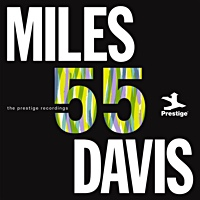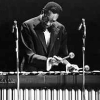Home » Jazz Articles » Album Review » Miles Davis: Miles '55: The Prestige Recordings
Miles Davis: Miles '55: The Prestige Recordings
If a listener asks why studying Davis' Prestige recordings from 1955 is worth the effort, here is the key. Cue up "There Is No Greater Love." OK. Who is playing? This is a joke, right? That is Miles. Sure. No matter what the level of technique—which is, putting it mildly, inconsistent—it is Davis. How do you know? Phrasing, rhythm, time, timbre—all of it. Why is red "red?" Because it is. Forget the philosophical discussions of qualia, the individual, conscious instances of experience that make a thing a thing. It is Miles. No one else sounded that way, especially in 1955—although he has spawned a legion of imitators in the past half century. Could he play as high as Dizzy Gillespie? No. Could he play as sinuously as Fats Navarro? No. Could he play as cleanly and logically as Clifford Brown? No. He was Davis. A few notes, maybe one, and a listener knew.
Davis famously said that it takes a long time to sound like yourself. Well, in 1955, Davis was 30 years old. He had started studying music at the age of 9. By the age of 12, he cared about little else. So do the arithmetic. It took Davis about 18 years to become almost immediately identifiable.
And people knew it. By 1953-1954, at least by some modern measures, his reputation had equaled or surpassed Gillespie, Harry James and Roy Eldridge. There was only one player he would never catch up to in life or death. Who could? He invented the jazz trumpet solo: Louis Armstrong. And that is just appropriate. Davis is quoted as saying (by Ricky Riccardi, Director of Research Collections at the Louis Armstrong House Museum), "You know you can't play anything on a horn that Louis hasn't played. I mean even modern." Content analysis (via Google) backs Miles' intuition up. Debatable? So are the origins of the universe. As Miles was known to say, "So what?"
Davis, of course, has an autobiography, written with Quincy Troupe (Simon and Schuster, 1989). Like its subject, people either love it or hate it. Davis rarely did not inspire strong feeling. His views on race, gender, the music business and other musicians are rarely admirable. And some people did not like his trumpet playing: early, middle or late period. Davis did not care. He was proud of not really caring.
The interesting thing about this audiophile collection of Prestige Recordings from 1955 is that it may just give some insight into precisely why Davis inspired such a spectrum of reactions. Some of the recordings, each of impeccable physical quality, are simply wonderful. "Stablemates," "Dr. Jackle," "How Am I to Know?" or "Just Squeeze Me" fall into that category. Either because of Davis, his rhythm section or his band mates, like Jackie McLean and John Coltrane, there is just an endless source of stimulation and evolution. Davis and McLean eventually fell out over McLean's playing, but what one finds here is beyond merely listenable. Coltrane, on the other hand, was still emerging. It is remarkable how much he grew between 1955 and 1959, when he recorded with Davis on Kind of Blue (Columbia Records). Paul Chambers may have barely passed the age of majority in 1955, but his bass playing is foundational, kid or not. He clearly saves a few players from themselves from time to time, especially Coltrane.
Then there are tunes that do not work. "Night in Tunisia" is not exactly terrible, but obviously that kind of playing was not Davis' forte. "I See Your Face Before Me" is barely audible through the Harmon mute, no matter what Ashley Kahn says about it in his very interesting liner notes. It is not until Davis gets to "Gal in Calico" that he is again in his metier. The others, among them drummer Art Taylor, get plenty of exposure as well.
Do remember that Davis was also recording for Blue Note at the time, so you can always go to his recordings with them for comparison. Frankly, some prefer his Blue Note work, Miles Davis (2 vols, Blue Note, 1954) as displaying more vitality and considerably less preciousness. As Davis says in his autobiography, "We were higher than a mother****** when we made that record." Who knows? Then he was able to leave Prestige for Columbia, sort of in hugger mugger, where Davis did in fact make jazz history.
This is an excellent collection of a great player in transition, becoming what might seem to be a kind of pen-penultimate version of himself. Since some of the original recordings (e.g., such as Miles and Milt Jackson, Quintet/Sextet (Original Jazz Classics, 1956) are not easy to find, serious students of Miles Davis will find this mid-period collection very worthwhile. It is a physically impressive production as well, with liner notes by Ashley Kahn replete with discocography, photos, and the like. It may not resolve any of the ambivalence that many feel about Miles Davis as a person or a musician, but genius that is not in some sense rebarbative is unusual indeed. And Miles Davis, for all that, was a genius.
Track Listing
I Didn't; Will You Still Be Mine; I See Your Face Before Me; A Night in Tunisia; A Gal in Calico; Dr. Jackle; Bitty Ditty; Minor March; Changes; Stablemates; How Am I To Know/ Just Squeeze Me; There Is No Greater Love; The Theme; S'posin.
Personnel
Miles Davis
trumpetJohn Coltrane
saxophoneRed Garland
pianoPaul Chambers
bass, acousticPhilly Joe Jones
drumsMilt Jackson
vibraphoneRay Bryant
pianoOscar Pettiford
bassPercy Heath
bass, acousticArt Taylor
drumsJackie McLean
saxophone, altoAlbum information
Title: Miles '55: The Prestige Recordings | Year Released: 2025 | Record Label: Craft Recordings
Tags
PREVIOUS / NEXT
Support All About Jazz
 All About Jazz has been a pillar of jazz since 1995, championing it as an art form and, more importantly, supporting the musicians who make it. Our enduring commitment has made "AAJ" one of the most culturally important websites of its kind, read by hundreds of thousands of fans, musicians and industry figures every month.
All About Jazz has been a pillar of jazz since 1995, championing it as an art form and, more importantly, supporting the musicians who make it. Our enduring commitment has made "AAJ" one of the most culturally important websites of its kind, read by hundreds of thousands of fans, musicians and industry figures every month.































